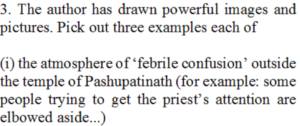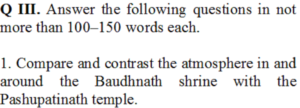Kathmandu Class 9 Textbook Questions and Answers CBSE English Chapter 10 NCERT Beehive
KATHMANDU
(Textbook Questions)
Thinking about the Text














1. A group of westerners wearing saffron clothes, try to get into the temple
2. Two monkeys start fighting
3. A princess come to temple. Everyone bows and makes way for her


1. A corpse being created at the bank of river Bagmati
2. Tibten immigrants selling bags, prints and jewellery
3. A person selling flutes


1. The sound monkeys fighting with each other
2. Film songs being played loudly
3. Sound of car horns and bells of bicycles


At Baudhnath stupa there was total silence. The huge dome had a road alround it. There were many shops at the outer edge of the stupa. Many of the shops were owned by Tibetans. They were selling felt bags, Tibetan prints, sliver jewellery. There were no crowds and over all the atmosphere was of heavenly stillness and quietness.


Film songs are loudly played in the streets. There is sounds car horns, bells of bicycles and hawkers shout about the things they are selling.
Author finds many things to eat and drink like marzipan, corn cobs, Coca Cola and some sharp smelling orange drink.


In spite of these differences the person playing flute has the same task of blowing wind into it. One will need to stop for a while to catch breath. The combination of the type of flute, its fingering technique and its range produce similar music.
Thus the author says that too hear flute is to be drawn into commonalities of all mankind.
Thinking about Language


| Column A | Column B |
| (i) break out | (a) to come apart due to force |
| (ii) break off | (b) end a relationship |
| (iii) break down | (c) break and enter illegally, unlawful trespassing |
| (iv) break away (from someone) | (d) of start suddenly ( a fight, a war or a disease |
| (v) break up | (e) to escape from someone’s grip |
| (vi) break into | (f) stop working |
Answers:
(i) and (d)
(ii) and (a)
(iii) and (f)
(iv) and (e)
(v) and (b)
(vi) and (c)


| Verb | Noun |
| Cremate | Cremation |
| Act | Action |
| Exhaust | Exhaustion |
| Invent | Invention |
| Tempt | Temptation |
| Immigrate | Immigration |
| Direct | Direction |
| Meditate | Meditation |
| Imagine | Imagination |
| Dislocate | Dislocation |
| Associate | Association |
| Dedicate | Dedication |


(ii) Ramesh is unable to tackle the situation as he lacks imagination.
(iii) I could not resist the temptation to open the letter.
(iv) Hardwork and dedication are the main keys to success.
(v) The children were almost fainting with exhaustion after being made to stand in the sun.
****
A Slumber Did My Spirit Seal
(Textbook Questions)
Thinking about the Poem




She seemed a thing that could not feel
The touch of earthly years.


Rolled round in earth’s diurnal course
With rocks and stones and trees.
****


0 Comments